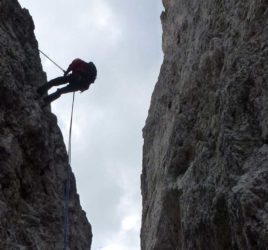What a Black Belt Means…
One of the more interesting things that I always watch for is the change in a person once they earn their first degree black belt. With a good practitioner, earning that shodan is usually a humbling and moving experience – especially if the tests they had to overcome involved a great deal of sacrifice and cleansing of improper skills physically, mentally, and spiritually. They gratefully acknowledge the grade and when they wrap that piece of cloth around their waist for the first time, they perhaps feel empowered and as if they have reached the top of a mighty summit.
But as they stand atop their peak, they must also realize that just beyond their mountain are many, many more mountains – each of them significantly higher than the one they just climbed. The sheer size of these peaks in no way detracts from the hard work the new shodan did to reach this point; rather these peaks serve as a strong reminder that there are many more challenges – many more mountains – that the practitioner has yet to climb. And the view should serve to humble the practitioner. It should remind them that their journey is only just beginning; that mastery is still far from their grasp and their quest will take them to even loftier heights, provided they have the emotional and spiritual maturity to accept the forthcoming challenges.
The catchphrase around the dojo I attend, is that earning your shodan is like getting your Learner’s Permit when you’re starting to figure out how to drive. You’ve got the very minimal basics down, but now it’s time to get out on the road and put those skills to the test. You’d never think of jumping into a NASCAR upon getting a Learner’s Permit thinking that you could even control such a vehicle. The same applies to the first degree black belt. You aren’t suddenly invincible, nor are you particularly gifted. What you have is a very limited set of skills that have been tested to a certain extent. Now it’s time to see what you do with those skills that determines how far you will travel in the art.
Or how quickly you will get sidetracked and defeated by your own ego and sense of entitlement.
What sometimes happens is the newly-minted black belt starts thinking they are a gift to the world of taijutsu. They decide that since they have reached this level, they should now teach others and bestow upon them their “immense wisdom” or physical gifts. Their whole attitude changes from one of a humble practitioner, to a cocky, swaggering braggart too quick with a critique and too certain of their own awesomeness.
Inevitably, they start to fall. Unable to look into the mirror and objectively see their own ego hamstringing their future success, they project their inadequacies upon others. If asked to sit on a testing board, they are often the harshest judges, dispensing cruel sentences without taking into account the many, many factors that go into assessing an individual’s performance and progress within the art. If asked to teach class, they are so certain their method of teaching is the best, they refuse to listen to criticism (let alone learn from it) and focus instead on propping themselves up even further. And with every passing day, their skills falter even more. The individual starts to slide backward in terms of physical talent. As the blinders of their crushing ego close even further, they are able to see less and less until they only see through the tiny pinhole of delusion that remains. Their behavior becomes surly; they feel a sense of entitlement and will do things like forget to show respect to their seniors and even to the Chief Instructor himself.
They assume they have it all when, in fact, they have nothing.
Over the years I’ve been at the dojo, I’ve been very fortunate to see a lot of good practitioners come up through the ranks. I can recount the black belt tests that were truly awe-inspiring to watch and help grade. For some of those people, their black belt test served to propel them onward to leap at new opportunities and accept new challenges. They used their success to breed more success. And today, as they quest ever further down the path, they are bright spirits full of ever-expanding potential and talent. They help out in the dojo; they help others; they serve to reinforce the strong ideals that are important as black belt students at the dojo; and they have a strong sense of community – grateful for the learning they have obtained and humble in their quest to acquire more; they show proper respect to those who have come before them and – most importantly – to their Chief Instructor.
Others? Well, unfortunately, this is not the case. And most disappointing are the practitioners who might have once shown such promise.
As senior students at the dojo – we watch everyone. We don’t always say much, but we always observe. And when we spot a talented practitioner, we grow hopeful. We love to see students coming up who display talent and perseverance – we want to see people succeed who will then help elevate the dojo to new heights through their skill. Usually, when we stand around or teach a class, it will be a parting comment, “Nice ukemi.” Then a nod. That’s it. We’ve said all we need to say to know that we saw that spark and that we hope the practitioner continues to train hard. Among ourselves, we’ll talk about who is coming up that we think is particularly talented.
And when we see someone we thought was talented start regressing instead of progressing, it’s a shame. Personally, I just write them off. Any inclination I had to train with them, or perhaps show them something, or make a correction – it stops. They become insignificant – just another body in the dojo unworthy of respect. If they can’t be bothered to understand and accept responsibility for their mistakes, I can’t be bothered to give a damn about them.
This might sound heartless, but the fact is (thankfully) there are always new people coming in – and many of them will turn out to be great practitioners who don’t let their immaturity and their ego trip them up.
Those are the people I want to train with; those are the people I would go into battle with.
Those are the people who will understand what a black belt really means.



